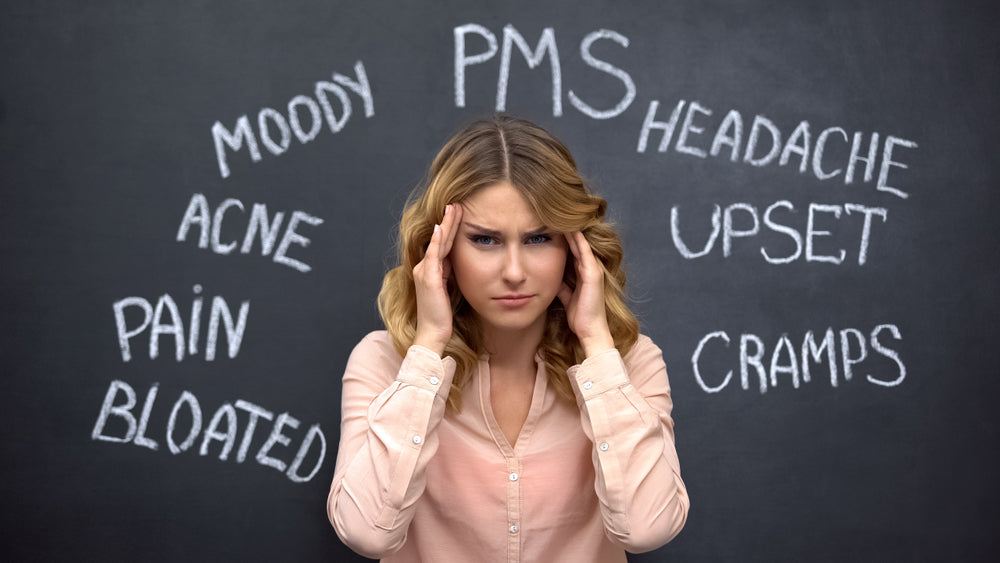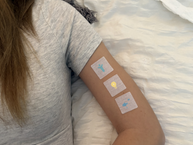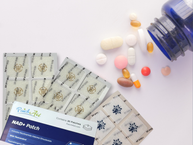If you experience mild, moderate, or severe symptoms of PMS, you’re likely interested in what you can do to prevent them. The good news is that you can have a lot of influence over your symptoms, which can include the following.
- Cramps
- Fatigue
- Headaches
- Irritability or mood swings
- Upset stomach, diarrhea, or constipation
- Trouble concentrating
Simple choices, such as eating well and being active, can make symptoms better. The Easy Cycle Patch by PatchAid is a nutritional supplement that is easy to take and formulated to target symptoms.* Ask your healthcare provider before taking any supplements. Now, here are nine ways to relieve PMS symptoms.
Exercise Regularly
Here’s yet another reason to exercise: it can make that time of the month easier. Walking is a good way to start, and you can make it brisker or walk uphill to make it more challenging if you like. Cycling, jogging, swimming, dancing, and playing sports are just a few of the other great options to try, assuming your doctor agrees.
Eat More Nutrients
Eating well doesn’t just give your body needed nutrients. It also can help you feel better, including when you have PMS symptoms. These are some nutritious foods to try.
- Vegetables, such as lettuce, spinach, broccoli, cauliflower, bell peppers, onions, tomatoes, asparagus, cucumbers, celery, and carrots
- Fruit, such as apples, bananas, oranges, tangerines, berries, melon, and peaches
- Legumes, or beans, peas, and lentils
- Fish, such as tilapia, swai, trout, salmon, tuna, and herring
- Healthy fats, such as avocado, olive oil, and flaxseed oil
- Nuts and peanuts
Though it’s great to pile on the veggies, it’s also good to keep in mind that fats and starches, even healthy ones, have small serving sizes.
Limit Junk Food
Though you may have cravings, it’s best to stick to nutritious foods as much as you can. These are some foods that may make you feel worse.
- Sugary foods and beverages
- Fried foods, such as fried chicken, fish sticks, French fries, hash browns, and doughnuts
- Refined carbs, such white bread and pasta, white rice, and white crackers
- Fast food, such as burgers, pizza, and burritos
Ask About Supplements
Even the best diets may not have every nutrient that you need, all the time. Plus, it can be stressful to worry about each vitamin and mineral every day. If you may be low in one or more essential nutrients for a healthy cycle, a supplement such as the Easy Cycle Patch by PatchAid can contain them.*
This topical patch has calcium, magnesium, antioxidant vitamins C and E, and vitamin B6. Functions of these essential nutrients include antioxidants, metabolism, and muscle relaxation to prevent cramping.
The Easy Cycle Patch by PatchAid also has herbal ingredients. For example, maca root has been used for a long time to support normal mood, and chaste berry fruit extract has been used to normalize symptoms of your cycle. Black cohosh and evening primrose oil are other natural supplements in the Easy Cycle Patch by PatchAid.
At a time when you may not want to take oral supplements due to PMS symptoms, the Easy Cycle Patch by PatchAid lets you avoid swallowing anything extra. Instead, you just affix a topical patch to your skin and allow the nutrients to be absorbed transdermally. Be sure to ask your doctor if the Easy Cycle Patch by PatchAid may be right for you.
Drink Water
Staying hydrated is essential for feeling good even at the best of times. When you’re fighting symptoms of PMS, it’s even more important. Mild dehydration can leave you with fatigue, a headache, or constipation. Drink plenty of water or other low-calorie liquids, such as decaf coffee and tea, low-sodium broth, and sparkling water, throughout the day.
Get Enough Sleep
It only makes sense to focus on sleep if your symptoms include fatigue, trouble concentrating, or headaches. Many people are short on sleep, but it is important to make it a priority. Set aside enough time each night, follow a bedtime routine consistently, and make sure your sleeping environment is comfortable.
Manage Stress
Stress can make symptoms worse, and it can also make it harder to handle the symptoms that you do have. There are many stress management techniques to try. They include the following.
- Exercise regularly.
- Hang out with friends who make you happy.
- Do things that make you laugh.
- Journal.
- Try yoga or meditation.
- Try a stress management app.
You can also ask an expert for help managing stress.
Be Comfortable
If your body is talking, why not listen? You may feel better if you avoid light and noise and stay in a quiet and dark environment. Or, you might find that a heating pad on your abdomen can provide relief.
Ask About Medications
Sometimes, you may need a little help to get through this time of the month. Medications can sometimes help if your doctor says so. Antidepressants, non-steroidal anti inflammatory drugs (NSAIDS) such as ibuprofen, and hormonal therapy may be recommended.
More Tips for Relieving PMS Symptoms
These are some more tips for relieving PMS symptoms.
- Talk to your healthcare provider if your symptoms seem severe or worsen. There is a chance that something is wrong, or that your provider can intervene.
- Keeping up healthy choices throughout the month, and not just after symptoms appear, can help you feel better all the time.
- Be sure you discuss any medications and health conditions with your healthcare provider, since these can affect PMS symptoms and how you experience them.
You deserve to have as many good days as possible while minimizing the days in which PMS takes over. There are many strategies for relieving symptoms, including with natural and healthy approaches. You can also talk to your doctor about supplements, such as the Easy Cycle Patch by PatchAid, that are designed to target PMS symptoms.* You are entitled to feel the difference when you support your health all month, every month!
*The Food and Drug Administration has not evaluated these statements. PatchAid products are not intended to diagnose, treat, cure or prevent any disease. Anyone with a medical condition should seek the advice of a licensed medical practitioner. Individual results may vary.







